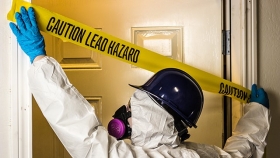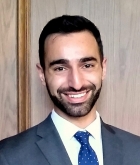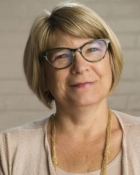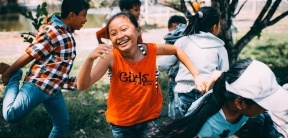You are here
The Surprising Roles That Landlords (And Philanthropy) Can Play In Promoting Children's Health

Daniel Cohn, Vice President of Strategy for the Mt. Sinai Health Care Foundation in Cleveland, Ohio, and Cara Matteliano, Vice President of Community Impact at the Community Foundation for Greater Buffalo “The Surprising Roles Of Landlords (And Philanthropy) In Promoting Children’s Health,” Health Affairs Blog, Oct. 9, 2019, https://www.healthaffairs.org/do/10.1377/hblog20191008.834703/full/ Copyright © 2019 Health Affairs by Project HOPE – The People-to-People Health Foundation, Inc.
A stable home is the bedrock of family life and child development and is especially critical to young children. However, healthy and affordable homes are often elusive for low-income families, and that puts children at risk of exposure to lead-based paint and other hazards. Lead poisoning alone can damage a child’s developing brain and cause lifelong, irreversible damage that affects learning, behavior, and health.
Older, post-industrial cities such as Cleveland, Ohio, and Buffalo, New York, have found that the vast majority of childhood lead poisoning occurs in rental units—often one- and two-unit properties—that are owned by thousands of small-time landlords. These landlords are key partners in protecting children from lead hazards and therefore play a pivotal role in shaping the future of our country’s cities and towns.
Recognizing this, leaders in Cleveland and Buffalo have built strong public–private partnerships to deploy new tools that assist landlords with making improvements to their properties. These improvements are necessary to ensuring low-income families’ access to healthy and affordable rental housing.
One driving force behind improving housing conditions is the installation of proactive rental inspection systems. Such systems typically require rental units to be assessed for and remediated of lead hazards before they can be rented. Renting units that are not certified as lead safe can have financial consequences for landlords, anywhere from a ticket to major penalties, plus the cost of remediation.
The Lead Safe Cleveland Coalition—a broad, cross-sector public–private partnership with more than 370 active members representing housing, health care, community development, policy, government, philanthropy, research institutions, neighborhoods, and more—launched in January 2019 with the goal of eliminating childhood lead poisoning in Cleveland within 10 years. Among the initial supporters were seven foundations. The coalition’s first step was to assist the city of Cleveland in adopting groundbreaking policy to require that rental units built before 1978 be certified as lead safe. A lead ordinance—based largely on 33 policy recommendations submitted by the coalition—passed on July 24, 2019 and is set for enforcement beginning March 2021.
The Buffalo and Erie County Lead Safe Task Force is another strong cross-sector initiative and is convened by the Community Foundation for Greater Buffalo. The task force was created to implement the data-driven recommendations of a comprehensive study on lead. As a result, the city of Buffalo is launching a pilot inspection program for rental properties with current code violations. (Several foundations—including the Community Foundation for Greater Buffalo, Health Foundation for Western and Central New York, Peter and Elizabeth C. Tower Foundation, Ralph C. Wilson Jr., Foundation, and John R. Oishei Foundation—and others supported an initial study.)
The Robert Wood Johnson Foundation is providing funding and technical assistance for efforts in both Cleveland and Buffalo.
Not Just Sticks
Housing code enforcement is an important tool, but it’s a blunt instrument that should not stand alone. Instead, resources and incentives for landlords must be in place for remediation to be timely and feasible. These supports encourage landlords to take proactive steps to make their properties lead safe, rather than waiting for enforcement after children have already been poisoned.
Contrary to popular belief, landlords in Cleveland and Buffalo typically are not absentee property owners or corporations aiming to turn a profit. Most of them live in the same or similar neighborhoods as their properties are located, or in the same metro area. In fact, rental properties in low-value housing markets frequently are not landlords’ primary sources of income but rather a way to supplement their own low-to-moderate incomes.
In September 2019, Cleveland announced the launch of a Lead Safe Home Fund, with leadership from the George Gund Foundation, Mt. Sinai Health Care Foundation, and Enterprise Community Partners, with an ambitious goal of raising $99.4 million over five years. The fund is a first-of-its-kind, public–private investment tool comprised of a Lead Safe Resource Center and a suite of Home Loans and Grants. The coalition views both components, in combination, as necessary to drive compliance with the city’s newly instituted proactive rental inspection mandate.
Cleveland’s Lead Safe Resource Center is envisioned as a one-stop shop, coordinating services and public education to serve families, property owners, and the broader community on all things related to lead poisoning prevention. The center will also serve as a central hub for workforce development to ensure that Cleveland’s landlords have access to highly qualified contractors, lead risk assessors, clearance technicians, and other lead safety professionals.
At the same time, Lead Safe Home Loans and Grants will offer landlords access to new financial products to help make complying with the proactive, lead safe certification system more feasible and streamlined. The goal is to make available low- or no-cost loans to eligible landlords with varying levels of need. Grants will also be available as an incentive for compliance with preventive measures. The fund will source investments from all sectors, including corporations, banking and financial institutions, philanthropy, health systems, the public sector, and more.
Meanwhile, the Community Foundation for Greater Buffalo has been using human-centered design to engage landlords in solving the lead problem. More than 40 landlords currently provide advice on education efforts for other landlords about lead hazards and connect them to appropriate resources. Typical Buffalo landlords own one to three properties, and many don’t have significant resources at the ready. Efforts are under way to create a new fund and central clearinghouse where landlords can access loans and grants to remediate lead hazards.
Tenants are also a focus in both Cleveland and Buffalo. Evictions have presented significant problems, especially related to poor housing conditions. For example, a tenant may call an inspector who comes and cites the property—then the landlord gets angry and evicts the tenant. It’s not legal, but it happens. Or there might be a problem in a residence that the landlord doesn’t fix for an extended period. The tenant believes that he or she can then withhold rent because of that. Technically, the tenant cannot, and the landlord can evict the tenant for nonpayment.
New York State just passed important new tenant protections under the Housing Stability and Tenant Protection Act. Alongside the new lead safe certificate policy, Cleveland also adopted an updated set of lead status disclosure mandates and and in October 2019 passed additional policies affording a legal right to civil counsel in eviction cases involving low-income tenants citywide. All such policy change requires broad education of landlords and tenants on their rights and responsibilities, as well as their role in protecting children from lead exposure.
Role Of Philanthropy
While organized philanthropy in places like Cleveland and Buffalo is helping move the needle on lead poisoning prevention, place-based funders are not the only ones acting with a sense of urgency and purpose. National philanthropy is also leading this work through the Lead Funders Action Network (LFAN), part of the Health and Environmental Funders Network. Co-chaired by the JPB Foundation and the Joyce Foundation, this group has supported research from Next Street and the Green & Healthy Homes Initiative on the financial tools available for lead remediation across the country. With help from the New York Community Trust, LFAN also has provided support to Earthjustice to produce a report on the legal mechanisms available to states and municipalities to reduce lead poisoning.
Organized philanthropy is needed now more than ever to spur and support progress on lead poisoning prevention. But if experiences from Cleveland and Buffalo tell us anything, it’s that no sector can take on this issue alone.
If health advocates want to make serious advancements in protecting children from the lifelong impacts of lead poisoning, they must garner both public- and private-sector buy-in and develop solutions that work for everyone, including landlords. Efforts to increase inspections and enforcement must be accompanied by resources for property owners that are backed by philanthropy, financial institutions, and government.
Lead poisoning affects everyone, and we all must take responsibility for addressing it together.
Daniel Cohn is the Vice President of Strategy for the Mt. Sinai Health Care Foundation in Cleveland, Ohio. The Mt. Sinai Foundation, along with the City of Cleveland, the Bruening Foundation, The Cleveland Foundation, the George Gund Foundation, the Saint Luke’s Foundation, the Sisters of Charity Foundation, the Third Federal Foundation, and United Way of Greater Cleveland, were the initial supporters of the Lead Safe Cleveland Coalition. The coalition is an inclusive, public-private partnership that addresses lead poisoning through a comprehensive, preventive, and long-term approach with more than 370 members representing over 120 organizations across all sectors, neighborhoods, and focus areas.
Cara Matteliano is a Vice President of Community Impact at the Community Foundation for Greater Buffalo. Cara advanced the WNY Coalition to Prevent Lead Poisoning, which resulted in the Community Lead Action Plan, an analysis of Buffalo’s lead poisoning data with recommendations for reform. She brought the national Green & Healthy Homes Initiative to Buffalo, a public/private partnership to improve homes for families living in low-income neighborhoods. Cara serves as co-chair of Engage New York, a state-wide network of foundation leaders who have adopted an action agenda that advances equity, social justice, civic and community participation to improve the lives of all New Yorkers.
From our Blog
Upcoming Events
|
Jul 29 2024 Zoom |
Jul 30 2024 Zoom |



